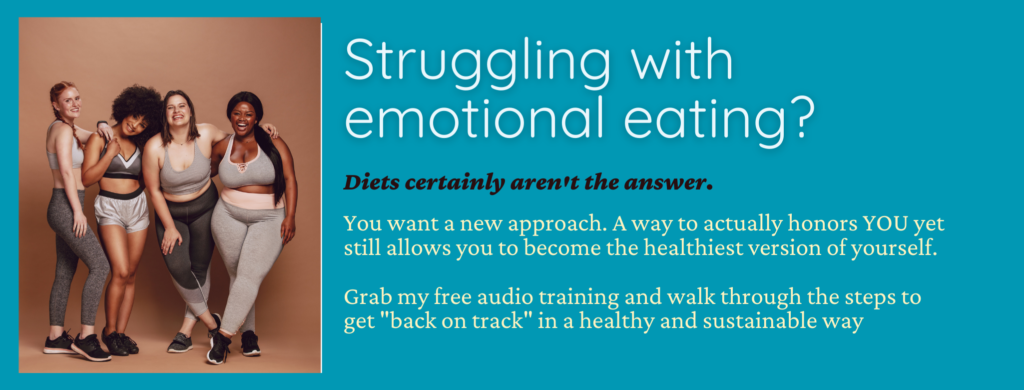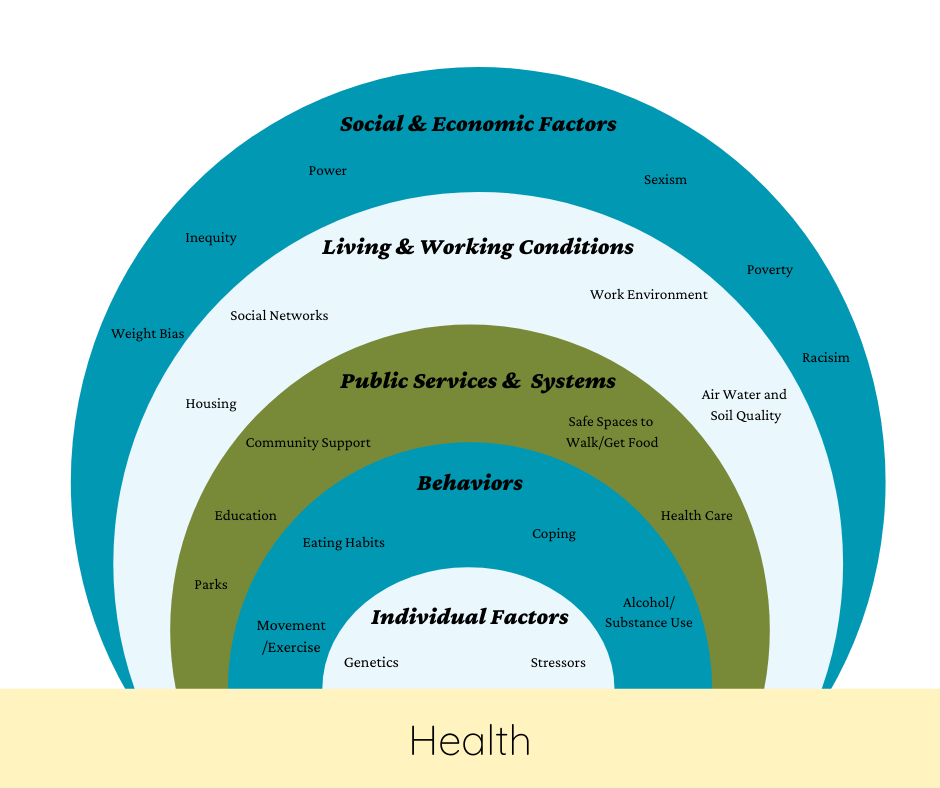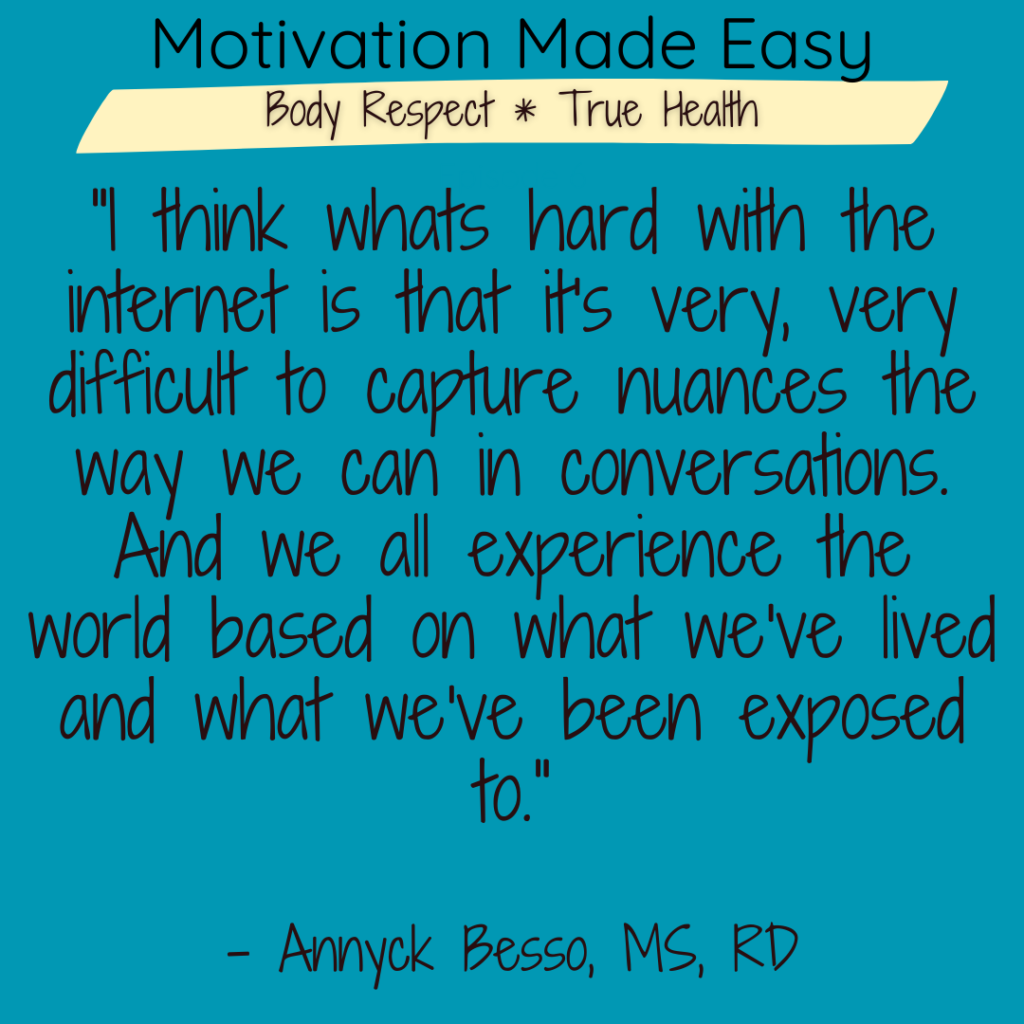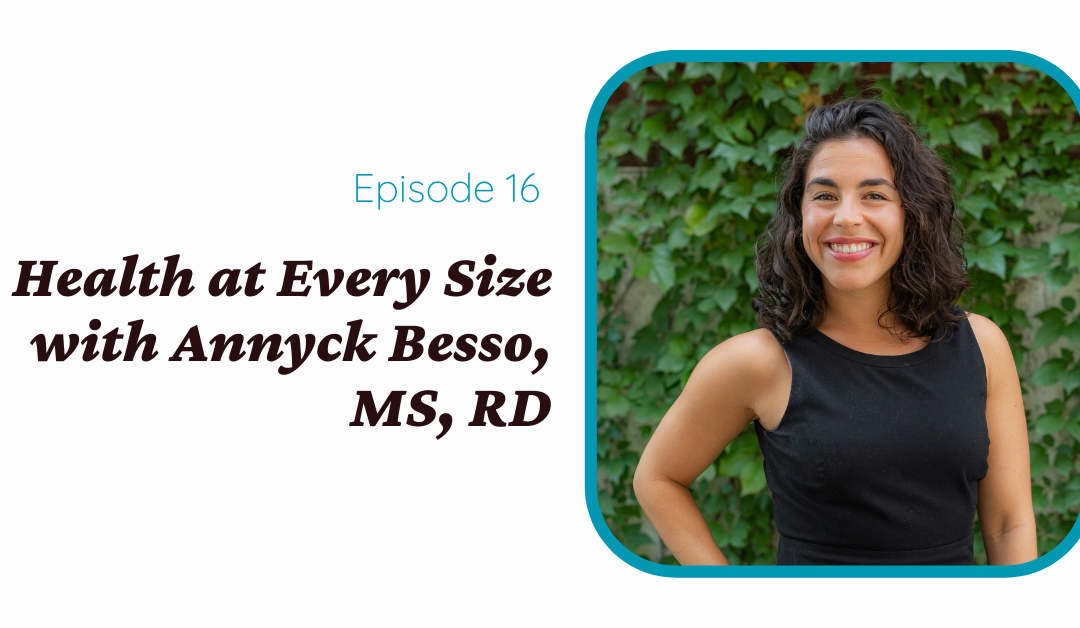Podcast: Play in new window | Download
Subscribe to The Innovative Therapist Podcast! Apple Podcasts | Spotify | RSS | More
Episode 16. Today I chat with registered dietitian Annyck Besso, MS, RD, about Health at Every Size. This is a super important discussion because there are a lot of misconceptions about it. Tune in to learn about some of the common myths about Health at Every Size. One of the myths we debunk include “Health at Every Size professionals are anti-weight loss,” among many others.
Annyck is a Registered Dietitian and the Founder of Sööma, a private practice that specializes in the treatment of eating disorders and sports nutrition located in Montreal, Canada, but serving clients in the United States virtually. Annyck has developed an expertise in the treatment of eating disorders in both private and academic medical center settings. After completing a Bachelors in nutrition and dietetics, Annyck received her Masters in dietetics at McGill University. Annyck recently moved back to Canada after practicing at Mind Body Health in Washington, DC for the past three years. During her time there, Annyck worked in private practice and collaborated closely with medical doctors and mental health professionals. She also developed and directed a day program where people of all ages were admitted and treated 20h per week.
Want to start from the beginning? Check out the Foundational Episodes of the Motivation Made Podcast here!
- Introduction: What is this podcast all about?
- Episode 1: Want to Get & Stay Motivated? A Crash Course on Motivation, Weight Loss, and Health
- Episode 2: How Dieting Steals Our Motivation
- Episode 3: How To Get Motivated To Improve Your Health (Motivation 101)
- Episode 4: How to Transform Health Fears Into Forward Progress

Did you grab my free audio training yet? It walks you through the simple 5 steps to not diet, but respond to your body when you are stressed about weight gain or feeling out of control with your eating. Grab it here!
What We Cover:
- Annyck’s personal experience with food and her body
- How she got into the field of dietetics
- The fact that Health at Every Size is not actually mainstream even in dietetics training
- What is Health at Every Size?
Health at Every Size – What Is It?
Health at Every Size is a social justice movement.
On an individual level, the movement is trying to move away from looking at individual behaviors in a vacuum, and broadening our view of health to consider an individual’s lived experience, including things like marginalization, and other factors that influence their health.
From a broader perspective, it acknowledges the privilege that comes from being able to make individual choices. It acknowledges that the higher rates of certain medical conditions in certain community and how we need to examine the larger systems that determine access to fresh foods and safe movement, quality health care, among other systemic shifts.
The movement also explores and discusses the health consequences of living in a world that is fat phobic and weight bias and that the stress of this can have health consequences that are more problematic than their body shape and size.
Interestingly, despite my bias and feel that many dietitians get this training on a more regular basis, Annyck stated that this is in fact not true.
Health at Every Size – What Isn’t It?
We debunk some of the common myths about Health at Every Size.
One of the biggest myths is that the Health at Every Size movement is anti-weight loss.
Some of the pushback includes:
- “Some people would benefit from weight loss.”
- “Not everyone in larger bodies are healthy.”
- The assumptions are that Health at Every Size is about encouraging people to eat pizza and donuts and watch TV all day and saying “you are healthy.”
Annyck stated that this is not at all what she and other Health at Every Size professionals are saying at all, but instead looking at the ways that the messages we are giving to people are actually impacting their health and their motivation to change. For example, if they are feeling shame and guilt, they are much more likely to not make a positive health change and the stress of this is very likely going to negatively impact their health.
Instead, as a HAES professional she tries to help people move towards health and however they define that. Weight loss is not the forefront goal, but could potentially be a part of the picture.
Health is much more complicated than just our health habits.
If we tell people they are ok, how will we get them to change?
We discussed some of the fears in the medical community that if you tell people they are “ok,” then “how will we get them to change?
We talked about how our medical system as a whole isn’t very good at supporting autonomy and choice.

The Polarization is Mostly Miscommunication
Annyck talks about some of the ways that Health at Every Size dietitians and other dietitians sometimes disagree and may feel criticized or misunderstood on social media.
She stated that she believes all camps can learn from one other, but the internet is a very challenging place to do so.

We talked about how vulnerable and challenging it can be to have these conversations. We talked about how we are all biased and also it’s tempting to pick the research studies that support our hypothesis.
Health at Every Size & Bariatric Surgery
We discuss Annyck’s experiences and view of bariatric surgery and again return to the importance of autonomy. We talk about how essential it is to have informed choice without pressure for any intervention choice you might make.
We talked about how important it is to have a nuanced conversation and not assuming there is one right solution for every person just based on their body size alone.
How to Know if you are Underfed
We talked about the importance of understanding the role of restriction and undernutrition and many times when Annyck works with people she sees a pretty quick reduction in binge eating.
“If you are eating 1200 or 1500 calories, you are underfed.”
We talk about the myth that you cannot be “underfed” if you are in a larger body. You can, and people often are.
Common Struggles with a Health at Every Size Approach
Another myth is that the anti-diet approach means you have to love your body.
It does encourage body acceptance. This is different from loving it and being grateful for it. It means holding the pain and grief and everything that comes with living in your body and not letting it keep you from doing then things that are important to you in your life.
She talked about the common desire as a health professional to want to come in and fix someone’s pain and how challenging it can be to not always be able to fix that for people.
She discusses stigma and fat phobia and how there are many spaces where it isn’t safe or comfortable to be a in a larger body. She ties this to the importance of continuing to make the world a better place for diverse bodies and how that can impact health.
Main Takeaways
- Health at Every Size is a social justice movement first and foremost. It helps us to challenge our weight-centric and weight biased view of health and the world, and recognizes that weight bias itself can be one of the most problematic factors
- It really still isn’t that mainstream and many people don’t know what it is or have misconceptions about it.
- Health at Every Size professionals are not necessarily against weight loss and they aren’t saying everyone is currently healthy or that no one would benefit from weight loss. These discussions are more nuanced and really hard to capture in one quote phrase or sentence.
- We agree on way more than we think. This has been my view for a long time. These conversations can be challenging because they can challenge our view of what is right or good, or whether we are right or good. But they are essential.
Disclaimer: This blog and podcast is for informational and educational purposes only. It is not a substitute for individual professional advice or treatment, including medical or mental health advice. It does not constitute a provider patient relationship.
